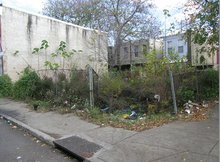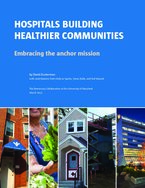0
Research
Community:
Jul 19, 2022
This ebook, authored by Next City, explores ways that creative placemaking can expand opportunities for low-income people living in disinvested communities.
The journalism Next City has produced for the series “For Whom, By Whom” chronicles how creative placemaking can expand opportunities for low-income people living in disinvested communities. These stories give lie to the false narrative that such neighborhoods are home to violence and deprivation instead of talent, imagination, and solutions. Here are communities that produce incredible feats despite being terminally under-resourced, and despite systemic neglect that has persisted for generations.
Authored by:
Topics: Community development, Mobility, Place-based, Racial inequalities, Research
 Shared by Malcolm Guy
Shared by Malcolm Guy
Malcolm Guy posted a
on Jul 19, 2022
This ebook, authored by Next City, explores ways that creative placemaking can expand opportunities for low-income people living in disinvested communities.
The journalism Next City has produced for the series “For Whom, By Whom” chronicles how creative placemaking can expand opportunities for lo
0
Research
Community:
Aug 5, 2019
CLPHA developed a general data sharing template that public housing authorities (PHAs) and their health partners can customize to suit their data sharing and collaboration needs. Please feel free to comment to share any uses/modifications your organization made to implement into a partnership.
Authored by:
Topics: Affordable Care Act, CLPHA, Community development, Cost effectiveness, Data sharing, Dental, Depression, Dual-eligibles, Funding, Health, Healthy homes, Legislation & Policy, Low-income, Medicaid / Medicare, Mental health, Metrics, MTW, Nutrition, Obesity, Partnerships, Place-based, Preventative care, Racial inequalities, Research, SAMHSA, Smoke-free, Stability, Substance abuse, Supportive housing, Sustainability, TA
 Shared by Steve Lucas
Shared by Steve Lucas
Steve Lucas posted a
on Aug 5, 2019
Disclaimer: This template is provided for informational purposes only and not for the purpose of providing legal advice. You should contact your attorney to obtain advice with respect to any particular issue or question. Use of this template, including its exhibits and attachments, does not create a relationship or any responsibilities between CLPHA and the user.
CLPHA developed a general data sharing template that public housing authorities (PHAs) and their health partners can customize to suit their data sharing and collaboration needs. Please feel free to comment to share any uses/modifications your organization made to implement into a partnership.
0
Research
Community:
Jul 21, 2018
A new study measured the mental health of Philadelphia residents before and after blighted lots had been converted into green spaces.
Authored by: Melissa Breyer for treehugger
Topics: Community development, Health, Mental health, Place-based, Research
 Shared by Housing Is
Shared by Housing Is
Housing Is posted a
on Mar 11, 2019
Melissa Breyer for treehugger
A new study measured the mental health of Philadelphia residents before and after blighted lots had been converted into green spaces.
0
Research
Community:
Jan 10, 2019
Local officials, impact investors, and philanthropy have important roles to play in helping communities access Opportunity Zone financing that benefits current residents, especially those with low or moderate incomes. Using Chicago and Cook County as a case study, we identify steps these actors can take to attract helpful, and limit harmful, investments. We find that the Opportunity Zones selected in Chicago and Cook County broadly fulfilled the incentive’s spirit, targeting areas that were more economically distressed. Going forward, it will be necessary to leverage available policy and philanthropic levers to compel private action in line with community interests.
Authored by: Brett Theodos and Brady Meixell for the Urban Institute
Topics: Community development, Funding, Housing, Legislation & Policy, Midwest, Place-based, Research
 Shared by Housing Is
Shared by Housing Is
Housing Is posted a
on Feb 14, 2019
Brett Theodos and Brady Meixell for the Urban Institute
Local officials, impact investors, and philanthropy have important roles to play in helping communities access Opportunity Zone financing that benefits current residents, especially those with low or moderate incomes.
0
Research
Community:
Feb 6, 2019
Research suggests that living in concentrated poverty is harmful to health, well-being, and economic mobility. Inclusionary zoning can break up poverty density by imposing legal requirements to create affordable housing across neighborhoods. In Montgomery County, Maryland, inclusionary zoning laws require developers to set aside 12 to 15 percent of new homes at below-market rates and allow the public housing authority to purchase a portion of these units. As a result, two-thirds of public housing residents in Montgomery County live in economically diverse, low-poverty neighborhoods. To assess the effects of these unique conditions, researchers explored how public housing residents’ social networks, neighborhood perceptions, and health outcomes differ based on their placement in mixed-income communities or traditionally clustered public housing.
Authored by: Heather Schwartz, Susan Burkhauser, Beth Ann Griffin, David Kennedy, Harold Green Jr., Alene Kennedy-Hendricks, and Craig Pollack for Housing Policy Debate, How Housing Matters
Topics: Community development, Housing, Mental health, Place-based, Research
 Shared by Housing Is
Shared by Housing Is
Housing Is posted a
on Feb 7, 2019
Heather Schwartz, Susan Burkhauser, Beth Ann Griffin, David Kennedy, Harold Green Jr., Alene Kennedy-Hendricks, and Craig Pollack for Housing Policy Debate, How Housing Matters
Research suggests that living in concentrated poverty is harmful to health, well-being, and economic mobility. Inclusionary zoning can break up poverty density by imposing legal requirements to create affordable housing across neighborhoods.
0
Research
Community:
Jul 19, 2018
The link between federal housing policy and public health has been understood since the nineteenth century, when housing activists first sought to abolish slums and create healthful environments. This article describes how the Obama administration—building on these efforts and those that followed, including the Great Society programs of President Lyndon Johnson—has adopted a cross-sector approach that takes health considerations into account when formulating housing and community development policy. The federal Department of Housing and Urban Development fully embraces this “health in all policies” approach. Nonetheless, the administration’s strategy faces challenges, including fiscal and political ones. Some of these challenges may be overcome by conducting quality research on how housing and community development policies affect health outcomes, and by developing a federal budget strategy that takes into account how investments in one sector contribute to cost savings in another.
Authored by:
Topics: Affordable Care Act, Community development, Disabilities, Health, Healthy homes, Housing, Legislation & Policy, Low-income, Mobility, Partnerships, Place-based, RAD, Research
 Shared by Housing Is
Shared by Housing Is
Housing Is posted a
on Jul 19, 2018
The link between federal housing policy and public health has been understood since the nineteenth century, when housing activists first sought to abolish slums and create healthful environments.
0
Research
Community:
Jul 13, 2018
Hospitals Building Healthier Communities aims to provide a resource for hospitals considering adopting or further integrating community engagement and economic development into their daily operations and their core mission.
Authored by:
Topics: Community development, Data sharing, Health, Housing, Low-income, Partnerships, Place-based, Research
 Shared by Housing Is
Shared by Housing Is
Housing Is posted a
on Jul 13, 2018
Hospitals Building Healthier Communities aims to provide a resource for hospitals considering adopting or further integrating community engagement and economic development into their daily operations and their core mission.
 Shared by Malcolm Guy
on Jul 19, 2022
Shared by Malcolm Guy
on Jul 19, 2022
 Shared by Steve Lucas
on Aug 5, 2019
Shared by Steve Lucas
on Aug 5, 2019

 Shared by Housing Is
on Mar 11, 2019
Shared by Housing Is
on Mar 11, 2019

 Shared by Housing Is
on Feb 14, 2019
Shared by Housing Is
on Feb 14, 2019
 Shared by Housing Is
on Feb 7, 2019
Shared by Housing Is
on Feb 7, 2019
 Shared by Housing Is
on Jul 19, 2018
Shared by Housing Is
on Jul 19, 2018
 Shared by Housing Is
on Jul 13, 2018
Shared by Housing Is
on Jul 13, 2018





